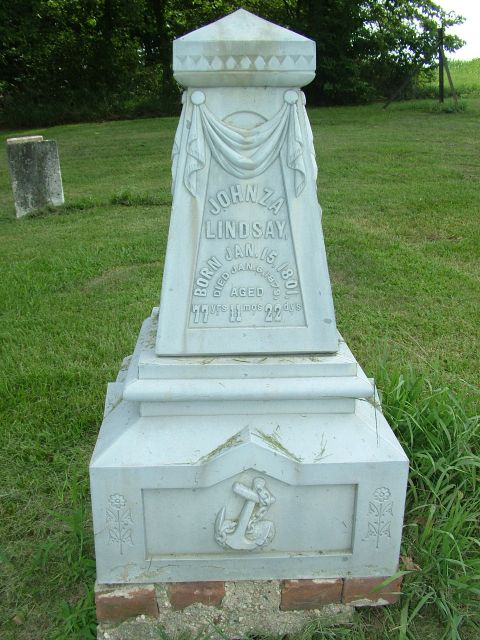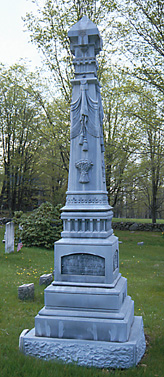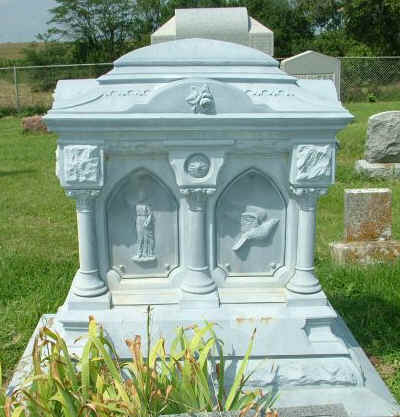|
|
<return to main page> |
|

One of several
cast-iron tombstones in the Mt. Pulaski,
Randolph, Downing & Turley cemeteries
Cast:
Presiding Judge: David Davis
Defendant: Reuben Miller, Menard County
Lawyer for Defendant: Abraham Lincoln
Plaintiff: Nathaniel Whitaker
Lawyer for the Plaintiff: David Campbell
Bailiff: Sheriff John C. Hurt
Preacher: Rev. Uriah Schwalb
Bartender: Raspus Finfrock
Wife of Defendant: Mrs. Miller
Wife of Plaintiff: Mrs. Matilda Whitaker
Jury - to be selected that day
- The re-enactment ending will depend
upon the voting of this particular jury –
Director: Phil Bertoni
Assistant Directors: Darrell Knauer, Bob McCue
________________________
Research Documents:
-Photocopies of 1854 & 1855 Lincoln & Mt. Pulaski Tombstone appeal trials from
Ilinois Supreme Court manuscripts
-History of Logan County; Stringer, 1911
-One Hundred Years – Mt. Pulaski, 1836-1936
-James Hickey; former curator of the A.
Lincoln Collection at Springfield Library
_______________
Abraham Lincoln and his law partner, William
Herndon, defended Reuben Miller in two Cast-Iron
Tombstone trials alleging that there was no
fraud, drunkenness or worthlessness in the
patent rights. While the Lincoln Illinois
courthouse fire of 1857 destroyed most of the
Mt. Pulaski and Lincoln county seat records,
some information of these two trials has been
preserved due to their appeals to the Illinois
State Supreme Court. Due to lack of a court
transcription, this re-enactment has been edited
for entertainment value. The actual judgment
rendered by each trial and its appeal will be
revealed at the end of the re-enactment.





|
Cast-Iron Tombstone Trial
8th
Circuit Court - Mount Pulaski Courthouse - 1854
Re-enactment & Historical Reading
Mount
Pulaski
Courthouse
Mount Pulaski, IL.
Show time:
Saturday, Sept. 6, 2008 – 4:00
pm
During Town’s Annual Fall Festival (Sept. 4 – 5
– 6)



Principal participants:
Abraham Lincoln
- Lawyer for the defendant, Ruben Miller of
Menard County
David Davis
- Judge of the 8th Circuit Court,
which covered approximately 450 miles
through 14 counties
Nathaniel Whitaker
- Plaintiff, owner of the Mount Pulaski House
Hotel
Page
1 Photos
Page
2 Photos
Page
3 Photos
Page
4 Photos
PHOTOS
by Allen Schaal
Cast [Nov.
18, 2006, Mt. Pulaski Courthouse Court Room, Performance #4]
|
This trial is only one of four known trials held in the
Mount Pulaski Courthouse during the mid 19th
Century [1848 – 1854]. All paper work of all the other
trials and judgments that were written in Mount
Pulaski’s courthouse were destroyed in the 1857
courthouse fire in Lincoln, Illinois. All records from
the Mount Pulaski courthouse had been transferred to
this new location in December, 1854, when the county
seat was voted to be moved from Mount Pulaski to
Lincoln, IL. The town of Lincoln was now more
populated. It was more centrally located and now on the
train line from Chicago to Springfield.
he Eighth Circuit was organized
March 21, 1839
, consisting of Champaign, DeWitt,
Livingston, Macon, Mason,
McLean, Menard, Sangamon, and Tazewell
Counties. Christian, Logan, Piatt, Shelby
and Woodford
Counties
were added to this Circuit in February, 1841.
In February 1843, Moultrie
County
was attached to the Eighth Circuit and Edgar and Vermillion in 1845.
In
1847, Livingston
County
was attached to the Ninth Circuit, and
Shelby
was attached to the Eighth making the Circuit consist of:
Champaign, Christian, DeWitt, Edgar, Logan,
Macon, McLean, Moultrie, Piatt, Shelby,
Tazewell, Vermillion, and
Woodford
Counties. This was the Eighth Circuit so famous in the history
of Abraham Lincoln.
By 1857, the
Eighth Circuit was reduced to
Champaign, DeWitt, Logan, McLean, Tazewell, and Vermillion
Countie. And, in 1861, the Circuit consisted of DeWitt, Logan, and
McLean
Counties, with the Circuit Judge receiving a salary of $1000 yearly.
In 1873, Ford and McLean
Counties were made the 14th Circuit; and in June of 1877, the Appellate Courts
were established, and the Circuit Courts were rearranged, with the
number of Circuits reduced from 28 to 13. The Eleventh Circuit consisted
of Ford, Iroquois,
Kankakee,
Livingston, and McLean
Counties. Each Circuit had three judges.
The Circuit
remained this way until 1897, when the 40th General Assembly passed:
"An Act to divide the State of Illinois, exclusive of the County
of Cook, into Judicial
Circuits."
Section
1. Be it enacted by the People of the State of Illinois, represented in
the General Assembly: That in lieu of the Circuit Courts provided by law
and now existing, the State of Illinois, exclusive of the County of
Cook, shall be and the same is hereby divided into judicial circuits as
follows…Eleventh Judicial Circuit-the Counties of McLean, Livingston,
Logan, Ford, and Woodford…"
|